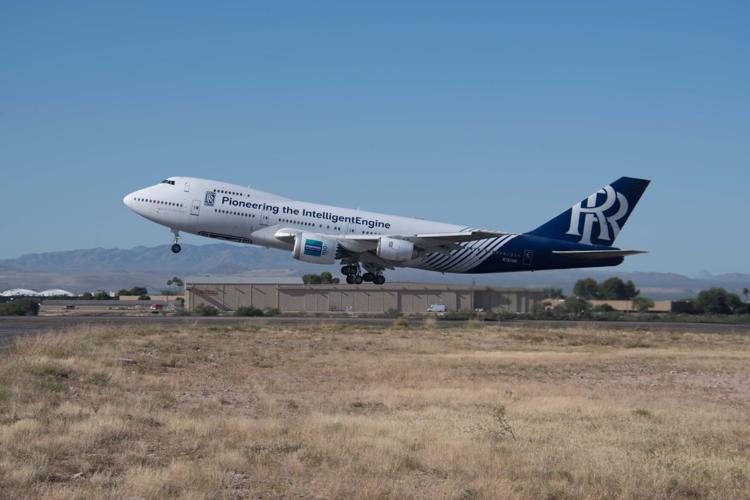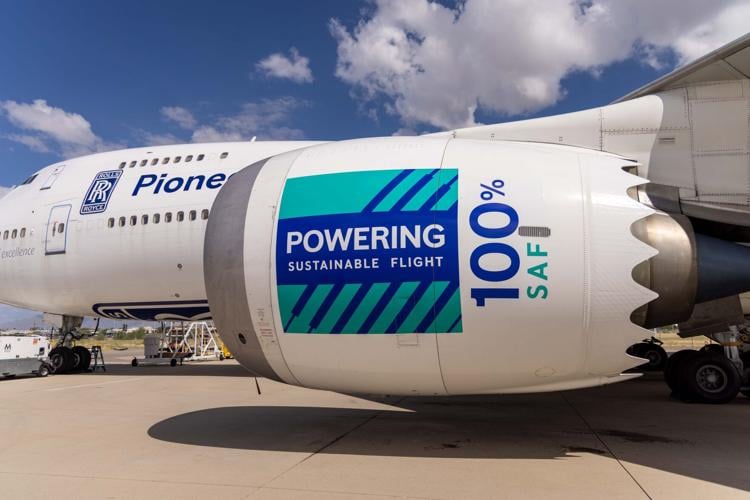A flight test carried out from Tucson recently was another small step toward a future where airliners are powered with cleaner fuel made from things like animal fat and agricultural waste.
London-based jet engine maker Rolls-Royce carried out a flight test on a Boeing 747 test plane out of Tucson International Airport with one of its flagship Trent engines burning 100% low-carbon, sustainable biofuel, and the three other, RB211 engines running on standard jet fuel.
Watch how aircraft engine maker Rolls-Royce tested an engine running on 100% sustainable fuel with a flight from Tucson International Airport. Video footage and photos courtesy of Rolls-Royce Holdings; additional photos courtesy of United Airlines and Airbus.
Rolls-Royce said it worked with Boeing and alternative fuel producer World Energy to carry out the Oct. 15 test using 100% “sustainable aviation fuel,” or SAF, which is made from nonfossil feedstocks such as cooking oil, plant oils, rendered animal fat, municipal waste and agricultural residues.
The plane took off and flew over New Mexico and Texas before returning to the Tucson airport 54 minutes later, said Rolls-Royce, which has been testing engines at TIA for nearly a decade.
Initial results confirmed there were no engineering issues with the engine, “providing further proof of the fuel’s suitability for commercial use,” the company said.
SAF, which produces about 80% less carbon emissions than standard jet fuel, already is in limited use by airlines under regulations allowing a maximum 50% blend with jet fuel.
But industry leaders including Rolls-Royce — one of the world’s biggest makers of aircraft engines, now unrelated to the luxury-car maker — are pushing for adoption of 100% SAF to meet global carbon-reduction goals.
In March, European aircraft maker Airbus successfully flight-tested 100% SAF in one Rolls-Royce Trent XWB engine on a twin-engine Airbus A350 airliner.
Rolls-Royce recently confirmed that all of its Trent engines will be compatible with 100% SAF by 2023 and also called for further industry-government collaboration to move long-haul aviation toward net-zero carbon emissions ahead of goals set by the United Nations.
“We believe in air travel as a force for cultural good, but we also recognize the need to take action to decarbonize our industry,” Simon Burr, Rolls-Royce director of civil aerospace product development and technology, said in announcing the flight test.
Boeing said the successful flight test shows that SAF can fully replace conventional jet fuel over the long term and is a viable solution to decarbonize aviation over the next 20 to 30 years.
Aircraft operators have been using SAF-jet fuel blends from more than a decade, but its use remains limited amid low production volumes and high prices.
SAF now costs about five times as much as regular jet fuel, according to the Oil Price Information Service, part of IHS Markit.
Some European nations are pushing a transition to SAF, with Norway setting a 0.5% annual quota for SAF use with a goal of 30% by 2030. Sweden, Finland and France are among other European countries proposing similar approaches, according to S&P Global.
In the U.S., the Biden administration in September announced an initiative to drive production of SAF to 3 billion gallons annually and reduce aviation emissions by 20% by 2030.
The plan, which includes fuel-tax credits to help scale up production, envisions enough SAF production to meet 100% of projected aviation fuel demand of 35 billion gallons per year by 2050.





